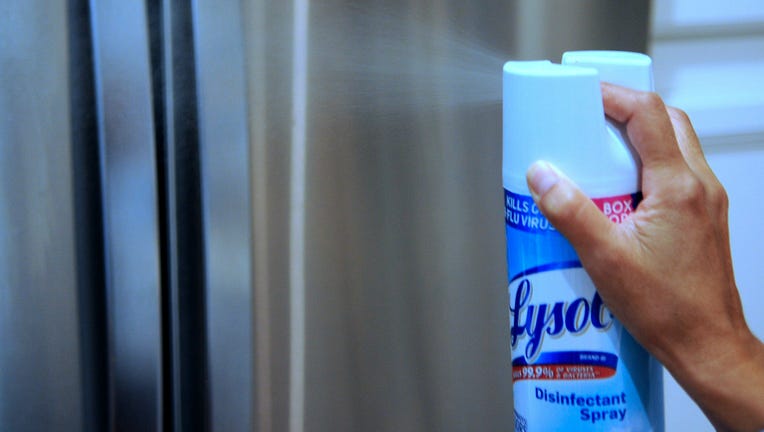More than a third of US adults are using cleaning products incorrectly: CDC study

Lysol disinfectant spray is used to clean a refrigerator in this photo illustration on July 7, 2020 in Orlando, Florida. The U.S. Environmental Protection Agency (EPA) has approved two Lysol products as the first to effectively kill novel coronavirus (Paul Hennessy/NurPhoto via Getty Images)
In trying to prevent the transmission of the novel coronavirus, more than a third of U.S. adults are putting their health at risk by using cleaning products incorrectly, according to a recent report.
The report in JAMA stated a survey by the Centers for Disease Control and Prevention (CDC) revealed that 39% of adults in the U.S. reported using cleaning products and disinfectants in potentially dangerous ways while intending to limit exposure to the deadly virus.
“Drinking or gargling diluted bleach solutions, soapy water, and other cleaning and disinfectant solutions" was one of the dangerous practices the authors of the survey reported.
The survey also found that 19% of respondents applied bleach to food items, such as fruits and vegetables, while 18% used household cleaning and disinfectant products on their hands or skin. Some 10% reported misting their body with a cleaning or disinfectant spray, while 6% said they inhaled vapors from household cleaners or disinfectants.
“These practices pose a risk of severe tissue damage and corrosive injury and should be strictly avoided," the researchers warned.
One-quarter of the approximate 502 U.S. adults who participated in the national online survey, which was commissioned by the CDC, experienced adverse reactions to cleaning products or disinfectants. Those effects included lightheadedness, headache and irritation of the eyes, skin, nose and sinuses, as well as nausea and breathing problems. Those who didn’t use the products safely were two times more likely to have detrimental effects than those who did not, according to the report.
The survey authors found significant gaps in knowledge surrounding the proper use of cleaning products among the adults surveyed. The largest gaps they found involved keeping hand sanitizers stored away from a child’s reach and how to safely prepare disinfectant and cleaning solutions.
The researchers cautioned that “mixing of bleach solutions with vinegar or ammonia, as well as [the] application of heat, can generate chlorine and chloramine gases that might result in severe lung tissue damage when inhaled.”
"Furthermore, exposures of children to hand sanitizers, particularly via ingestion, can be associated with irritation of mucous membranes, gastrointestinal effects, and in severe cases, alcohol toxicity," they added.
The study authors also stressed the importance of storing products away from pets.
The CDC conducted the survey after U.S. Poison Control Centers saw a surge in calls regarding exposure to household chemicals at the start of the pandemic.
The researchers recommended health officials continue to educate the public on safe cleaning techniques as well as advising people to follow directions on the labels of their cleaning products.
More on Fox News.

